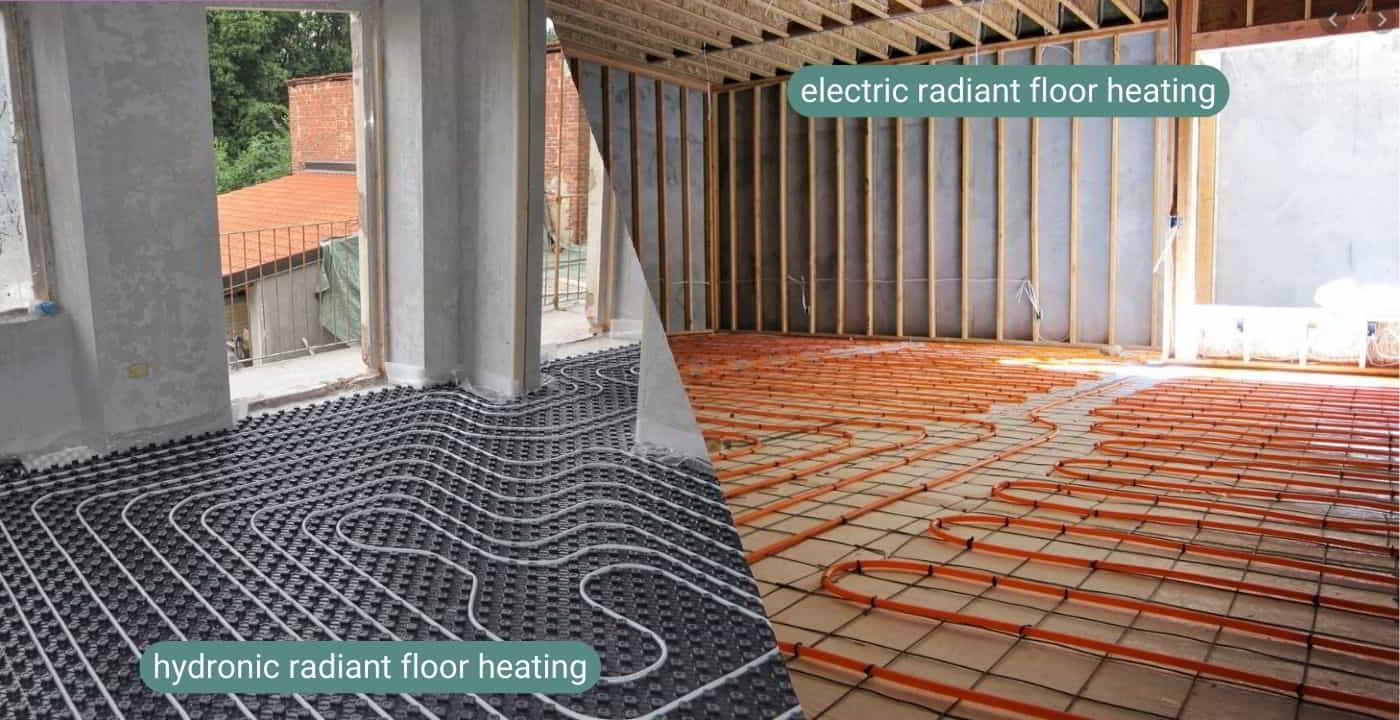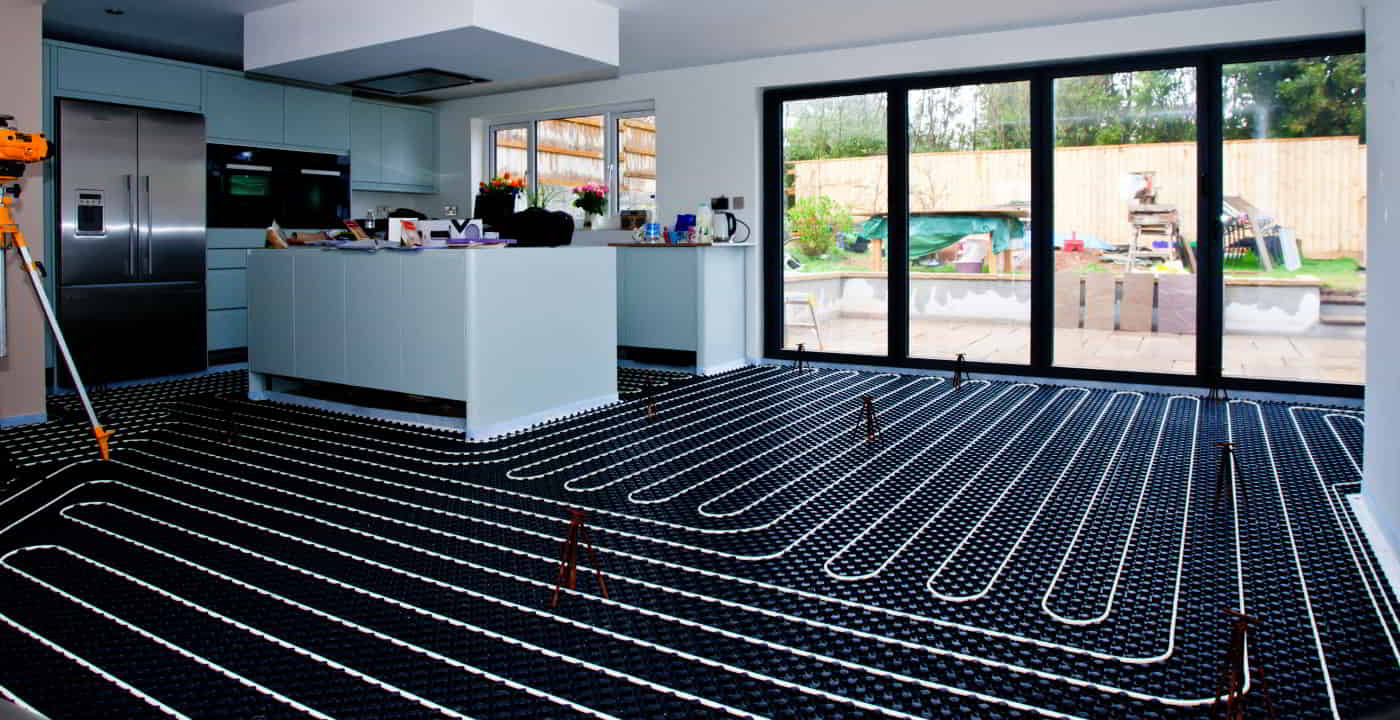Key Notes
- There are two main types of radiant floor heating systems: hydronic and electric.
- The cost of radiant floor heating varies, depending on factors such as the type of system, the size of the area to be heated, and labor costs. Per Sq ft pricing can vary between $1.1-$20.
- Installation costs are a significant factor to consider, typically sitting in the region of $75-100 p/h
With the rising cost of energy bills in the US, finding an efficient and cost-effective heating solution for your home or business is more important than ever.
Many homeowners are now choosing radiant floor heating over alternative home-heating systems because of its ability to provide both greater comfort and greater energy efficiency.
In this article, we will discuss the benefits of radiant floor heating, how it works, and the various factors you need to consider before installing it.
What is Radiant Floor Heating?

Radiant floor heating uses thermal radiation and electromagnetic waves to provide comfortable heat to your entire home.
As these systems are in use, the heat radiates from the floor to heat the objects around you. This is a quick, efficient way to stay comfortable during those cold, chilly months.
There are three different types of systems used for home-heating systems: Electric, Hydronic and Hybrid radiant floor heating systems.
In this article we focus on the far more popular Electric and Hydronic systems.
How Much Do Heated Floors Cost?
The cost of heated flooring varies on several factors, but this is a price breakdown based on each system.
| Type of Radiant Floor Heating | Cost |
|---|---|
| Electric radiant floor heat | $7.9 – $15 per sq ft |
| Hydronic radiant floor heating | $6 – $20 per sq ft |
| Geothermal in-floor heating | $9.78 – $11.25 per sq ft |
| Solar radiant floor heating | $3.3 – $8.1 per sq ft |
| Propane Underfloor heating | $7.1 – $21.1 per sq ft |
For an average 2,400 square-foot home, you can expect to pay between $14,000 to $48,000 for a whole home radiant hydronic floor system.
If you’re interested in an electric system, homeowners typically pay anywhere from $19,000 to $36,000. These numbers include the cost of labour and all materials.
To save on costs, some people install radiant floor heating in a specific area of their home.
If you go this route, you can expect to pay $6 to $20 per square foot for a hydronic system. An electric setup will cost between $7.9 and $15 per square foot.
Our radiant underfloor heat mats are a premium product and on average cost around $14 once 100 sq ft+ is reached. However, you will see a slightly higher price on our kit, due to the additional items being included, notably the transformer.
How to Prepare for a Radiant Floor Heating Project

If you’re interested in radiant floor heating, you’ll want to consider a few things before hiring a professional.
First, make sure the type of heating system is right for you. Call your friends, check reviews, and even contact a few professionals. They can help you determine if this system is right for your needs.
Secondly, you’ll want to think about your budget. If you can’t afford all of the costs associated with this system, it may not be suitable for you.
Aside from the cost of materials and installation, you also want to consider the cost of labour. These all can add up quickly, so be sure to have a budget with a bit of wiggle room.
In Floor Heating Costs
After deciding to proceed with a radiant heated flooring project, understanding the costs involved is a good idea. Unfortunately, knowing this number isn’t easy—it depends on several factors.
Here are some considerations to make that impact the cost of the project:
Labor
The cost of labour for installing heated flooring is a good chunk of the overall price. This number is usually around $75 an hour.
Here are a few factors to consider that affect the cost of labour:
- Typical rates in your specific area
- Proximity to the job site
- The schedule and workload of the installer
- The cleanup and disposal process
Before choosing a professional for the job, you may call around to get different quotes. This can help you find a price that works for you!
Size of Heated Area
Wherever you’re looking to install radiant floor heating, the area’s size significantly impacts cost.
Smaller projects are usually more costly than larger ones on a per square foot basis.
This is because there are certain things you are always going to need such as a thermostat and in our system’s case, a transformer, meaning you pay more per square foot on smaller projects than larger ones.
Zoning Needs
Another factor that determines the heated flooring cost involves temperature zoning.
If you install a radiant heating system for your entire home, you may have rooms that require more heating energy than others.
This issue may encourage you to install a zoning system, which allows you to set different temperatures in different rooms.
However, adding this feature will increase the overall cost of the project.
How Much is Heated Flooring? Different Types Available

If you think radiant floor heating is right for your home or business, you’ll need to decide on the type of system you prefer.
This chart offers an overview of the different types of heated flooring and the average costs.
| Radiant Floor Heating System | Average Cost |
|---|---|
| Electric Radiant Heated Floors | $19,000 – $36,000 |
| Hydronic Radiant Floor Heat | $14,000 – $48,000 |
| Geothermal In-Floor Heating Systems | $9,500 – $27,000 |
| Solar Radiant Floor Heating | $8,000 – $19,500 |
| Propane Underfloor Heat System | $17,700 – $50,400 |
Keep reading for an in-depth breakdown of the different costs of in-floor heating.
Electric Radiant Heated Floors
This type of radiant heating system is one of the most popular options. It works with wires or pipes found underneath the floor.
Many homeowners choose this type of system when an HVAC unit can’t effectively heat every room in a home.
Additionally, an electric radiant floor heating system usually works best on floors made of stone, tile, and concrete – any floor type that’s cool to the touch.
To this point, these heating systems are also very effective in areas where you walk with bare feet, such as the bathroom.
Typically, this electrical setup involves a wire mesh or a group of individual wires that run beneath the floor surface.
In a 2,400-square-foot home, this system will cost anywhere from $7.9-$15 per square foot.
Hydronic Radiant Floor Heat
A hydronic radiant floor heating system is the most popular type.
This unit utilizes a series of heated pipes that run underneath the floor.
A boiler pumps hot water through the pipes, creating effective, long-lasting comfort.
Additionally, these systems can also be zoned, meaning the heated floors are controlled for multiple areas of a home.
This setup works with zoning valves or pumps, including thermostats that help regulate the temperature.
The average underfloor heating cost of a hydronic system is between $6-$20 per square foot.
If you want an eco-friendly heating system, consider choosing hydronic radiant heat.
Geothermal In-Floor Heating Systems
One less popular option for heated floors is a system that uses geothermal technology.
Working similarly to a hydronic system, geothermal radiant floor heating also has a set of pipes with heated water.
However, this type of system gets energy from the ground via geothermal technology which is then used to heat the water and provide comfort to your home.
The installation cost of a geothermal heated floor system will run between $9.78 -$11.25 per square foot.
Solar Radiant Floor Heating
A solar radiant heating system is an efficient option that’s gaining in popularity.
This setup works similarly to a hydronic system, but instead of using a water heater, the energy needed comes from the sun.
Using solar panels, the energy is stored and used to heat water within the system which is then pumped through the pipes underneath the floor.
Another option with this system type is to use solar energy to power a mat that sits under the floor. This works similarly to an electric radiant heating system, only with solar technology.
If you’re interested in this system type, you can expect to pay anywhere from $3.3-$8.1 per square foot.
Propane Underfloor Heat System
A propane in-floor radiant system is very similar to the other types, but it uses propane for heating energy.
Propane is used to heat the water within the system, and then the water is pumped through piping beneath the floor just like a radiant hydronic system.
The average cost for purchasing this system and installation will run around $7.1-$21.1 per square foot.
This includes the costs for installation plus tubing and labour ($6 to $20 per square foot).
In total, expect the average overall costs for propane system to sit between $17,700 – $50,400
How Much Do Heated Floors Cost to Operate?

When you look at the operational cost associated with a radiant heated floor system, you’ll see you can save a lot of money when compared to traditional heating systems.
Homeowners can expect to pay between $1 to $5 for every 24 hours of use in a 100-square-foot area.
This averages out to about $3 to run the unit for 24 hours, compared to $20 to utilize a common heating system, such as a furnace or heat pump.
The reason for this drastic difference is that mass can hold much more heat than air.
Also, this allows you to run your radiant floor system at 6 to 8 degrees lower than a standard heating unit.
Heated Flooring Cost By Type of Flooring
The cost of a radiant radiant floor heating system will be largely informed by the type of flooring material you choose to install.
Below is a table of average costs for installing radiant floor heating using some of the most commonly used flooring materials.
| Flooring Material | Cost per Square Foot | Pros | Cons |
|---|---|---|---|
| Ceramic Tile | $2 – $20 | Durable Long-lasting Available in a wide variety of colors Resistant to water and stains | Can be cold underfoot Grout lines can collect dirt and be difficult to clean |
| Wood | $6 – $12 | Warm, natural aesthetic Can add value to a home. Can be refinished multiple times Suitable for many décor styles | Requires regular maintenance Can warp & become discolored |
| Composite | $5 – $15 | More resistant to water than traditional wood. Available in a variety of designs Easier to maintain than solid wood in a bathroom environment | Not completely immune to water damage Cannot be refinished like solid wood Quality varies by manufacturer |
| Concrete (EPS) | $0.75 to $2.00 | Extremely durable even in a wet environment. Modern aesthetic Resistant to mold and mildew Excellent at storing heat | Hard underfoot Cold feel Potential for slipperiness if not properly finished. |
| Concrete (XPS) | $1.00 to $3.00 | Retains the benefits of EPS but offers better thermal insulation Moisture-resistant, making it great for bathrooms Can be textured or finished to reduce slipperiness | Still hard and potentially cold underfoot If not sealed properly, can be susceptible to staining Might not provide the “warm” aesthetic some people prefer in bathrooms |
Heated Flooring Cost of Materials
If you’re interested in one of these systems, the underfloor heating cost you’ll pay will include the price of the materials.
Depending on the type of system you choose, you could need several materials. However, some can be cost-effective.
Here is an overview of the price of materials you’ll need in order to have in-floor heating.
| Materials | Cost |
|---|---|
| Tankless Water Heater | $1,500 to $2,900 |
| Boiler | $2,100 to $4,000 |
| Hydronic System Tubing | $0.80 to $1.25 per sq. ft. |
| Electric Mat | $5.00 to $8.00 per sq. ft. |
| Thermostat | $100 to $400 per unit |
Tankless Water Heater or Boiler
If you choose a tankless water heater, expect to pay $1,500 to $2,900. These can be used just for the radiant system, or also work to heat water for other purposes in the home. When needing to heat a larger space, consider a boiler. These cost around $2,100 – $4,000.
Hydronic System Tubing
If you choose a hydronic system, you’ll need a series of flexible tubing. These run about 80 cents to $1.25 per square foot.
Electric Mat
For electric systems, some use a mat to provide heated comfort. These mats, including the loose wiring materials, cost about $5.00 – $8.00 per square foot.
Thermostat
A thermostat, or multiple thermostats, is needed to regulate the temperature in your radiant floor heating system.
As there are several different types of thermostats on the market, the cost can vary.
Homeowners can expect to pay around $100 to $400 for each thermostat.
Heated Flooring Cost of Installation
When thinking about a heated floor cost, you must consider the price of the installation. In fact, this part of the process can cost more than the heated floors themselves.
Suppose you’re having an electric radiant heating system installed. In that case, it’s important to note that you’ll need an electrician for the electrical wiring setup, including the installation of a new breaker to the electrical panel.
Hiring one of these professionals will typically cost you $250-$300 to hire one of these professionals, and you’ll also have to pay them around $75 – $100 an hour.
Do I Need a Permit or Inspection?
Before installing one of these systems, you’ll most likely need an inspection and permit.
This often has to do with your electrical, mechanical, or plumbing systems. The inspections and permits you’ll need will depend on the type of system you choose.
Should I Install Radiant Floor Heating Myself?
Installing a radiant floor heating system can be a complex project. As such, we don’t recommend handling this on your own.
In fact, doing so can be very dangerous, even if you’re experienced with electrical or plumbing systems.
However, you may be able to purchase the materials yourself, and even help out the contractor with some steps if they allow it.
Benefits of Radiant Floor Heating

A radiant floor heating system can elevate your home’s comfort. Check out the benefits of radiant floor heat for your home or business:
Energy Efficient
These systems can help you save on your energy bills. These systems are among the most efficient out there.
As the common radiator needs to be heated to more than 167 degrees Fahrenheit to heat up a space, a radiant floor heating system only requires a maximum temperature of around 84 degrees.
This can result in substantial energy savings. You may even save hundreds of dollars every year!
If you’re looking to reduce your carbon footprint, this system may be right for you.
Works with Any Floor Type
Another perk of radiant heated floors is that they work with almost any flooring type (depending on radiant heat type i.e. cables can’t go under hardwood floors).
However, some floors are better suited for these systems than others.
These options include ceramic tile, natural stone, porcelain, and laminate.
When looking for an ideal floor material, look for options that aren’t too thick, including ones with high thermal conductivity.
Heated Tile Floor Costs
Heated tile floors are a luxurious and practical addition to any home or business.
On average, the cost of installing a heated tile floor can range from $8 to $12 per square foot, but this can go up or down depending on the specific requirements of your project.
Invisible System
One leading benefit of radiant floor heating is that these systems are virtually invisible to the human eye.
Unlike HVAC systems with large units, radiant heat materials are all located under the floor.
This means you won’t have bulky systems taking up much-needed space in your home!
No Maintenance Needed
Dealing with maintenance is one of the biggest drawbacks of standard HVAC systems.
With radiant floor heating, these systems should never need any servicing at all!
Once they’re installed, they should work effectively for many years to come, as repairs are extremely unlikely.
If you’re not a huge fan of scheduling maintenance tasks, a radiant floor heating system may be right for you.
Under Floor Heating Quote - Green Wave Distribution
If you’re interested in experiencing the power of radiant heating, contact us today for more information on our range of underfloor heating solutions.
Our friendly and knowledgeable team will be happy to guide you through the process and help you choose the perfect system for your needs.





